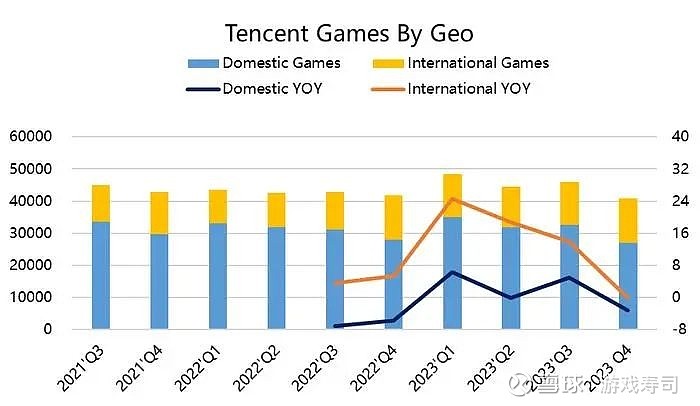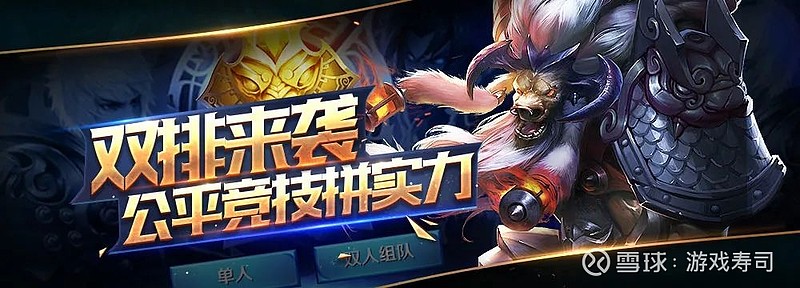type
status
date
category
summary
language
面向群体
游戏品类
资料类型
平台
tags
password
Sub-项目
作者
文章链接
来源
标签
Parent 项目
发布时间
slug
icon
On March 20, 2024, Tencent Holdings released its financial results for the fourth quarter and the full year of 2023, highlighting two significant sets of data.
Decline in Domestic Game Revenue

The first noteworthy data set concerns domestic game revenue. In the fourth quarter of 2023, Tencent's domestic game revenue decreased by 3% year-over-year to 27 billion Chinese yuan.
This indicates that the Q4 2023 figure represents a new low for domestic game revenue over the past three years. However, this data alone does not paint the full picture, leading us to the second set of data.
Increased ARPPU for PC Games

The second data set is derived from the ARPPU (Average Revenue Per Paying User) figures provided in Tencent's Investor Kit. In Q4 2023, the ARPPU for Tencent's PC and mobile games in China was between 485-495 yuan and 225-235 yuan, respectively.
Tencent's ARPU Definition: quarterly "Average Revenue Per paying User accounts" or "ARPU", is our online game net revenues derived from ACG, MMOG or Mobile Games during the quarterly period divided by the quarterly active paying user accounts of these games during the quarterly period; our definition of ARPU may not be comparable to similarly titled measures presented by other online game companies.
Thus, the ARPPU for Tencent's PC and mobile games in China in Q4 2023 was 485-495 yuan and 225-235 yuan, respectively, compared to 455-465 yuan and 235-235 yuan in Q4 2022 for PC and mobile games, respectively.
With revenues decreasing, the mobile game ARPPU remaining stable, and the PC game ARPPU increasing, this suggests a decrease in the number of active paying users.
Decline in Active Users
A decrease in active paying users could indicate a simultaneous decline in overall active user numbers or suggest that previously active paying users have ceased making payments. Neither scenario is positive.
For Tencent, which owns major esports titles such as "Honor of Kings," (王者荣耀)"Peacekeeper Elite,"(和平精英,China PUBGM) "League of Legends," and "Valorant," boasting large Daily Active Users (DAU), the number of active users is likely the most crucial metric.
This is because, for big DAU esports games, high-quality matches and gaming experiences rely on a substantial base of active users.
Some might wonder why this is important, especially in games like "Honor of Kings," where buying in-game advantages is minimized, suggesting a level playing field in terms of competition.
While it's true that the initial values in a single match are fair, ensuring fairness in the matching system's ability to pair players of similar skill levels is also vital. An unfair match, such as pitting novices against professional esports players, would not provide a fair competition, similar to mismatching NBA and NCAA players.
"Fair competition" encompasses not only equality at the starting line but also the fairness in the game matching system's ability to group players of similar skill levels. This fairness relies not just on sophisticated matching algorithms but also on having a sufficient number of active users.
A lack of enough active users can lead to long matchmaking times, degrading player experience, or mismatches, such as pairing lower-ranked players with top-tier players, resulting in poor player experiences and potentially causing a vicious cycle of user attrition.
Therefore, for Tencent's focus on large DAU esports and social games, maintaining a high number of active users is paramount. This may even require providing benefits obtainable only through gameplay and social interaction to non-paying players, ensuring an engaged user base and a high-quality gaming experience.
The apparent decrease in Tencent's active paying user base is a concerning sign. The "Matthew effect" is pronounced in big DAU esports and social games: user growth can be explosive, but user attrition can also accelerate rapidly.
2024年3月20日,腾讯控股发布2023年第四季度及全年业绩,其中有两组数据值得关注。
国内游戏收入下降
第一组是国内游戏收入,2023Q4国内游戏收入同比下降3%至270亿元人民币。

换句话说,2024Q4数据是近三年的国内游戏收入新低。
只是这一组数据还不能说明什么,接下来是第二组数据。
端游ARPPU升高
第二组数据是腾讯官网投资者工具箱的ARPPU数据,2023年Q4腾讯游戏端游和手游国内的ARPPU分别为485-495元和225-235元。

注意,这里的ARPU是业内通常所说的ARPPU(平均每付费用户收入)。
Definition: -- ARPU: quarterly "Average Revenue Per paying User accounts" or "ARPU", is our online game net revenues derived from ACG, MMOG or Mobile Games during the quarterly period divided by the quarterly active paying user accounts of these games during the quarterly period; our definition of ARPU may not be comparable to similarly titled measures presented by other online game companies.
因此,2023年Q4腾讯游戏端游和手游国内的ARPPU分别为485-495元和225-235元,而2022年Q4端游和手游的ARPPU分别为455-465元和235-235元。
收入下降,手游ARPPU不变,端游ARPPU升高,说明:活跃付费用户减少。
活跃用户减少
活跃付费用户减少,可能代表着活跃用户数也同步减少,也可能是原本活跃的付费用户不再付费,都不是什么好的现象。
而活跃用户数,对于手握《王者荣耀》、《和平精英》、《英雄联盟》、以及《无畏契约》等大DAU电竞游戏的腾讯而言,可能是最重要的指标。
为什么呢?
因为对于电竞等大DAU游戏,高质量的对局和游戏体验,建立在庞大的活跃用户基数上。
这话可能一些朋友不太理解:《王者荣耀》不能买数值(确切地说是数值的比重较小,也就是轻数值),这不就是公平竞技了吗?
对,但不完全对。
我们单纯看单场对局,对局双方的初始数值是公平的,不至于出现像《全民超神》那样别人的英雄初始数据就比你高。
但问题在于,系统匹配的对局双方的游戏水平是否能维持公平呢?如果给你匹配一些菜鸟玩家,对面是专业电竞选手,即使初始数值公平,但你觉得这场对局公平吗?
这就像让NBA和NCCA球员同场竞技,是不公平的。

“公平竞技”并不只是赛场上的大家处于同一起跑线的公平,还包括游戏匹配系统需要把游戏水平近似的玩家匹配在一起的公平。
而这种公平,不仅依赖匹配系统的精妙算法,还依赖于足够的活跃用户数。
没有足够的活跃用户数,就会导致:
轻则匹配时间过长,影响玩家体验;
重则错位匹配,比如给黑铁玩家对局匹配一个王者玩家,造成较差的玩家体验,反之亦然。
而不良的玩家体验造成用户流失,形成恶性循环。
所以对于腾讯重点的大DAU的电竞·社交游戏,活跃用户数是重中之重,甚至需要对零氪党等平民玩家发放需要对局·社交才能获得的福利,来保证活跃玩家数和高质量的游戏体验。
而现在,腾讯的活跃付费用户数明显减少,这不是一个健康的信号。
大DAU的电竞·社交游戏的马太效应是很明显的,用户增长的时候势头很猛,但用户流失的时候,也会同样加速。
- 作者:何北航
- 链接:http://gamesushi.cn/article/de8e2223-223d-470a-99d9-45bfcacc6e32
- 声明:本文采用 CC BY-NC-SA 4.0 许可协议,转载请注明出处。